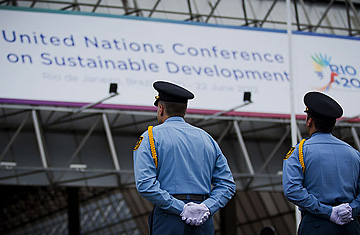
A report released by the United Nations Environment Programme (UNEP) indicates that the world remains on an unsustainable track.
World leaders set the global agenda for sustainable development at the Earth Summit in 1992 and since then governments around the world have agreed on hundreds of goals to protect the environment and improve human well-being. This week, Brazil is hosting the Rio+20 Summit as a follow-up to the gathering that occurred 20 years ago. On June 20, world leaders — which notably did not include U.S. President Barack Obama — began arriving in Rio for the final negotiations. They'll have their work cut out for them — a draft text negotiated by diplomats earlier this week was dismissed by environmentalists as "deeply disappointing." But as TIME's Bryan Walsh wrote earlier, there's little expectation things will improve.
This begs the question, "How much progress have we actually made?" Not much, suggests a report released earlier this month by the UN Environment Programme (UNEP).
The Global Environmental Outlook (GEO-5) evaluates 90 of the most pressing environmental goals, including stabilizing greenhouse gas emissions, promoting food security, and protecting ecosystems and biodiversity, and concludes that significant progress has only been made in four of those goals. These include:
1) Eliminating the production and use of substances that deplete the ozone layer
2) Removal of lead from fuel
3) Increasing access to improved water supplies
4) Boosting research to reduce pollution of the marine environment
As a whole, the report emphasizes a message we've been hearing for years: growing populations and economies are pushing the environment to "destabilizing limits." Even so, the GEO-5 also reminds us of two major trends that seem to reflect not just the environmental changes but also the economic and geopolitical realities of the modern world.
The first of these trends, according to the report, is that "meeting the global need for food will be one of the most important challenges of this century". Producing enough food for the world's population while minimizing the damage on ecosystems and simultaneously reducing poverty, supporting livelihoods, securing food safety, and promoting animal welfare is a challenge, says the GEO-5. In other words, the complexity of the food system, which lies at the intersection of agriculture, economics, and development, make food security a challenge.
In addition, the rapid economic growth of the Asia Pacific region has had negative environmental implications, such as dramatically increasing greenhouse gas emissions, that affect the rest of the world. For global efforts on curbing climate change to succeed, the Asia Pacific region has to step up its own fight against climate change, says the report, because many of the countries that are most vulnerable to it are in Asia.
What's the take-home message of all this? Although the level of progress on sustainable development has been disappointing, some are hoping that the upcoming Rio+20 could lead to renewed commitment and decisive action.
"Two decades ago the world committed itself to a more sustainable path for development," Shahid Naeem, the Director of Science at the Earth Institute's Center for Environmental Research and Conservation (CERC), told TIME. "Now that we are meeting again and things have not improved nearly as much as we had hoped this time will be an important time to lay out a plan that can get us on the path to a brighter, healthier, sustainable future."
